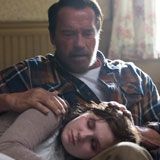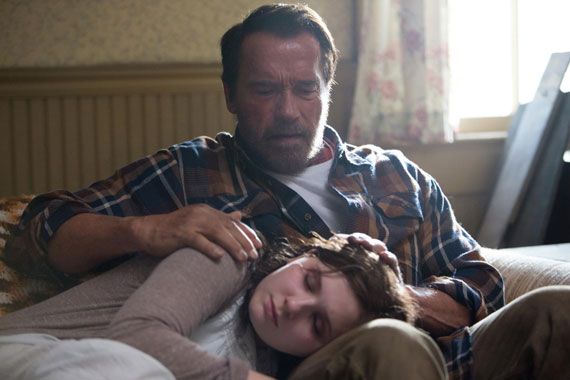For decades, Arnold Schwarzenegger has been more than an action hero. He's been a titan, an unstoppable force, the definition of invincible. But in his latest film, "Maggie," he's faced with a challenge that offers no bad guy to topple, no win to be had. His daughter is dying, and there's nothing he can do, save for shed a few tears. In short, "Maggie" is not what most fans would expect when hearing that Schwarzenegger made a zombie movie.
The directorial debut of Henry Hobson, "Maggie" is a zombie drama about what happens to a rural Midwest family in the wake of their eldest daughter being bitten. That inky black bite marks Maggie ("Zombieland's" Abigail Breslin) for death. In her final days, Maggie's father (Schwarzenegger) reminisces with her, cares for her, and wonders what to do when she turns from his firstborn into one of the walking dead. The law demands Maggie be turned over to the police for confinement, and eventual euthanasia, but family man and farmer Wade struggles with the cruel possibility that it might be kinder to put down Maggie himself.
Fans looking for Schwarzenegger to kick all kinds of zombie ass will be gravely disappointed, much like those who thought "The Grey" would give them Liam Neeson fighting wolves were let down. Nonetheless, Schwarzenegger delivers a moving performance here, albeit a mostly silent one. His scenes with Breslin display a softness he's rarely accessed in his work. And the moment when a tear trickles down his face is mesmerizing precisely because of all the unstoppable heroes he's played before.
Breslin confidently steers the narrative as its central figure. She's not just a teen facing her own mortality, but a young woman learning to take control of her body and choices. It's an interesting development, as no one actually asks Maggie what she wants in the end, just as no one dares say the word "zombie."
A graphic artist turned director, Hobson has an eye for striking cinematography and an ear for impactful sound design. Wide shots of the isolated family home spell doom, much like the lack of songbirds and the recurring soundtrack of a hurried heartbeat. Similarly enthralling is Hobson's depiction of a crawling apocalypse. News reports speak of dwindling crops, while Wade laments the failing of the electric grid. A brief scene in a city shows streets abandoned after curfew. The land back home is littered with posters of the missing, and the fields and forests of this nameless rural town may be hiding deadly zombies. It's a promising stage for a serious take on the zombie genre. Sadly, Hobson makes "Maggie" a one-note affair.
The premise and setting are compelling. The performances are subtle and strong. Yet "Maggie" loses impact in that it is relentlessly grim. From the film's first moments the world is gray, the situation bleak. As it staggers along, barely any color or joy is allowed in to add depth to its drama. Ultimately I didn't mind that "Maggie" wasn't some sort of action-horror affair, I actually admired the risk of that choice. But it's a shame Hobson missed the mark on the drama. This genre-bender could have been something biting and profound. But instead, Hobson settled for dark with a slathering of dreary.
"Maggie" is playing as part of the Tribeca Film Festival. A theatrical release will follow on May 8.


